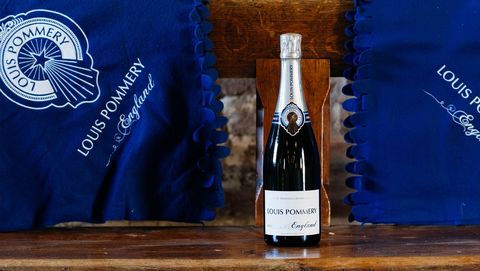Members
Louis Pommery England: bringing the French méthode to a British terroir

Vranken-Pommery Monopole became the first major champagne house to produce an English sparkling wine when it launched Louis Pommery England in 2017. The end product is a combination of English determination and French savoir-faire
Vranken-Pommery first announced its intentions to start up a UK operation in 2016 after purchasing the Pinglestone Estate in Hampshire. It was a visit to the area by the champagne house’s top executives which first gave the company the idea of producing an English sparkling wine.
“Travelling around the countryside around the pretty town of New Alresford, we just fell in love with the region,” says Clément Pierlot, chef de cave at Vranken-Pommery. “We got to a hill just outside the village and something just happened.
“After the initial visit, we started to do some research into the soil conditions of the area – but we already knew that this was a fantastic place to make wine,” Pierlot says.
Louis Pommery England uses a combination of chardonnay, pinot noir and pinot meunier grapes. With its chalk-rich soil, the terroir of Pinglestone Estate provides remarkable similarities to the subsoil present in the Champagne region, but with its own identity and character.
A meeting of English and French cultures
“The idea for Louis Pommery England was to create a sparkling wine entirely on English soil, from vine to bottle,” says Pierlot.
Establishing a vineyard in England, he says, allowed the company to take advantage of a sense of ‘freedom’ that tends to be more lacking in the French wine industry. “I think there is something very entrepreneurial in the English character,” he observes. “Here, we had the freedom to plant our vines where we wanted to. We don’t have these kinds of habits in France, where wine production is much more regimented.”

Coupling this English attitude with French winemaking expertise – the famous méthode champenoise – makes for a good match, says Pierlot.
“I think that the English spirit of optimism goes together quite well with our more romanticised French concept of wine.”
Vranken-Pommery chose the Louis Pommery brand name in honour of the man who founded the champagne house, but who remains relatively unknown compared to his widow Jeanne-Alexandrine Louise, who took on the company after her husband’s death.
“Louis Pommery founded the company, but died two years after setting it up,” Pierlot explains. “We decided to name our English brand after him since he was a pioneer in the champagne industry, and creating an English sparkling wine was something of a pioneering venture on our part.”
The future of English sparkling wine
As more and more champagne houses set up ventures in the UK, what was once considered a niche and even laughable sector may now be starting to develop into a viable one. Whilst conditions for wine production in England have usually been considered less than ideal, the effects of climate change now mean that the country is becoming more and more favourable to the growing and maintenance of vines.
As with all its operations, Vranken-Pommery has paid particular attention to ensuring that Louis Pommery England is produced sustainably. The grapes are grown as organically as possible, and the vineyard has already received a certification from Sustainable WineGB.
“From the start, we decided to work without herbicides – which hasn’t been an easy task in a country with so much rainfall,” Pierlot jokes. “But this really was a priority for us, as was respecting the biodiversity of the region in general.” To this end, the company has worked with local associations on projects like badger protection, as well as installing hives for bees and allowing sheep to ‘eco-graze’ on the estate.
Developing a new international brand
Going forward, Pierlot sees great potential for growth despite potential difficulties. “There is a whole new marque to create, and the industry will also need competent, motivated workers to take care of the vineyards. There will certainly be ups and downs, but this is nothing out of the ordinary.”
Vranken-Pommery also predicts a bright future for English sparkling wines on an international level.
“The English terroir brings us amazingly qualitative sparkling wines,” comments Julien Lonneux, CEO of Vranken-Pommery UK. “The growing interest customers have shown over the past couple of years has been very encouraging: there seems to be a real appetite for trying something different. Alongside our champagne, still wine and port wine operations, we see excellent prospects for promoting this quintessentially English luxury product on the global market.”